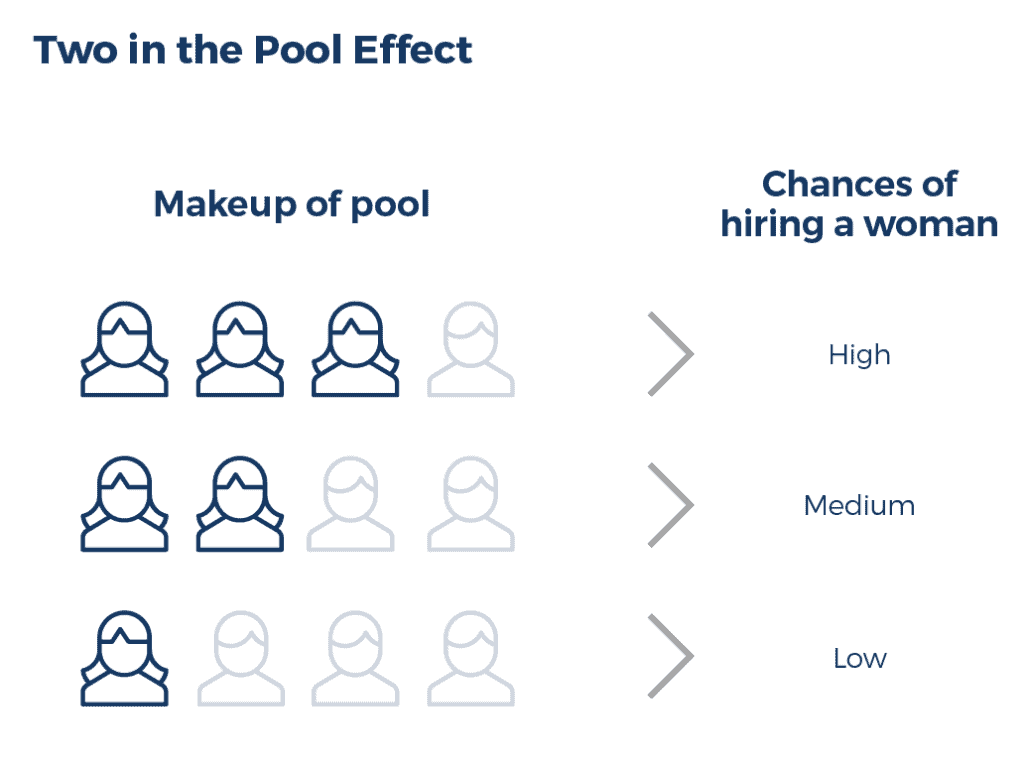The Employer Playbook supports the Greater Moncton Immigration Strategy 2020-2024. The strategy is a five-year plan that outlines the contributions of immigrants to Greater Moncton’s economy. It also details the actions taken to both attract and integrate immigrants into the community. The Employer Playbook is available in French on the Greater Moncton Immigration site.
Clear and inclusive job descriptions are important when recruiting immigrant talent. They will ensure that appropriate applicants aren’t inadvertently screened out and that the best person for the job is determined.
Need to figure out your absolute must-haves and would-be-nice-to-haves for job descriptions? It’s important to get this right, as job descriptions often include many non-essential requirements for a role that could inadvertently screen out suitable candidates. For example, did you know when determining whether to apply for a job, men will apply when they meet only 60 percent of the qualifications, whereas women will only apply if they meet 100 percent1?
When considering immigrant candidates, remain open to any additional skills and experiences that they may offer. Experience with international markets, additional language fluency, and connections to growing segments of the local market are all value-added qualities.
This worksheet will help you to define essential versus non-essential job duties. Developed by the Human Resources Management Association (now Chartered Professionals in Human Resources of British Columbia & Yukon), this tool can help you create a more precise job description and rank each candidate’s skills and experience based on their résumé. This will allow you to screen résumés objectively — without bias — and identify the best candidates to interview.
This printable template scorecard may be of use.

1A Hewlett Packard internal report as cited in “Why Women Don’t Apply for Jobs Unless They’re 100% Qualified,” Harvard Business Review, August 2014.
Looking for suggestions on how to write more inclusive job descriptions? Check out these tips:
| Resource | Link – EN | Link – FR | Description |
|---|---|---|---|
| Working NB | Recruitment supports | PETL Working NB | Recruitment and retention| WorkNB (travailnb.ca) | Working NB provides support in recruiting candidates, writing job postings, and accessing job fairs and job banks. |
Need to assess language requirements for prospective hires? The Centre for Canadian Language Benchmarks (CCLB) can help you assess the language proficiency of immigrants using national standards for both official languages. Consider using CCLB levels in job descriptions to ensure that the right candidates apply for the job.
Language proficiency and communication skills are often a concern when evaluating immigrant candidates. Consider recommending language programs like those of Le Cafi-NB to international students and immigrant candidates (see resources).
| Resource | Link – EN | Link – FR | Description |
|---|---|---|---|
| English Conversation Circle (ECC) | Services - MAGMA - AMGM | PROGRAMS - MAGMA - MAGMA (magma-amgm.org) | MAGMA offers virtual English conversation circles to anyone in Greater Moncton, regardless of immigration status, who wishes to practice speaking English. |
| French Conversation Circle | English – Le CAFi (cafi-nb.org) | Contactez-nous – Le CAFi (cafi-nb.org) | Le Cafi offers French conversation circles to those who want to practice speaking French. |
| Blended Online Language Training (BOLT) - Working NB/CCNB | Program Page | Brochure - Southeastern Brochure - North Region | BOLT offers flexible online language classes aimed at helping newcomers learn while also managing a work schedule. |
| PREI - CAFi CAFI International Student Retention Initiative | International Student Retention Program (ERP) – CAFi (cafi-nb.org) | Programme de rétention des étudiants internationaux (PRÉI) | The CAFI International Student Retention Program assists international students and graduates with English language skills, vocational training including job shadowing, employer networking, and job readiness training through the Workplace Essential Skills (WES) program. |
Gone are the days of want ads in the newspapers. And go-to job search websites such as Indeed or the Canada Job Bank don’t always effectively reach immigrant talent. Discover how organizations can recruit in, creative new ways.
Are you looking to reach immigrant talent beyond traditional job search engines such as Indeed or the Canada Job Bank? Using these websites is often time-consuming, especially for small and medium-size enterprises (SMEs) with limited human resources capabilities. And for immigrant job seekers, these sites don’t always allow their qualities and skills to be highlighted. Achieving a more diverse workforce begins with creating a more diverse candidate pool. Consider posting your job ad with the following:
Developing relationships with these organizations is a great way to attract immigrant talent, as many of them offer job readiness programs for immigrants and prepare them for jobs in in-demand sectors. Another effective strategy is to encourage your current immigrant employees to make referrals. This also lets your staff know that you are committed to expanding your immigrant talent pool.
And when advertising a role, be sure to include relevant health and safety policies so as not to deter potential applicants. Workplace safety is a top priority for most job seekers.
| Resource | Link – EN | Link – FR | Description |
|---|---|---|---|
| Working NB | Recruitment supports | PETL Working NB | Recruitment and retention| WorkNB (travailnb.ca) | Working NB provides support in recruiting candidates, writing job postings, and accessing job fairs and job banks. |
| Atlantic Immigration Program / MAGMA | Services - MAGMA - AMGM | PROGRAMS - MAGMA - MAGMA (magma-amgm.org) | The Atlantic Immigration Program assists employers in hiring skilled workers and recent international graduates who want to live and work in New Brunswick. To learn more, email [email protected]. |
| Head Start to Employment | Head Start to Employment - New Brunswick Multicultural Council : New Brunswick Multicultural Council (nbmc-cmnb.ca) | Getting Started - New Brunswick Multicultural Council: New Brunswick Multicultural Council (nbmc-cmnb.ca) | The New Brunswick Multicultural Council’s Head Start to Employment program supports employers in attracting, hiring, and retaining globally competitive talent. |
| Skills Launch / MAGMA | Skills Launch – New Brunswick Multicultural Council (nbmc-cmnb.ca) | Skills Launch - New Brunswick Multicultural Council: New Brunswick Multicultural Council (nbmc-cmnb.ca) | The Skills Launch Immigrant and Refugee Employability Project for Youth and Adults connects local employers with immigrant talent. This full-time program helps participants hone their job search and interview skills through occupational and sector-specific orientations, learn career-focused language and workplace essential skills, and obtain experience through paid job placements. |
| Immigration Greater Moncton | Welcome to Moncton | Bienvenue au Grand Moncton | Immigration Greater Moncton is a one-stop shop of services for those wishing to immigrate, live, study, or work in the area. This web portal includes a list of resources and programs for employers looking to hire immigrant talent. |

Have you ever considered job fairs or networking events as a way to attract immigrant talent? In person or online, many employers find job fairs one of the most successful ways to recruit newcomers who are seeking employment. These events provide opportunities to connect directly with local agencies and share job openings. And, if your company is large enough, consider hosting your own event. Be sure to advertise the event on your company’s Facebook page as well as on other relevant social media in the region.
| Resource | Link – EN | Link – FR | Description |
|---|---|---|---|
| Working NB | Recruitment supports | PETL Working NB | Recruitment and retention| WorkNB (travailnb.ca) | Working NB provides support in recruiting candidates, writing job postings, and accessing job fairs and job banks. |
| City of Moncton | Greater Moncton Newcomer | Salon de l'emploi pour les nouveaux arrivants | The city of Moncton organizes the Greater Moncton Newcomer Job Fair several times a year to connect newcomers and international students to jobs. |

If you have trouble hiring the right person from the domestic candidate pool, then recruiting from overseas may be an option. The Government of New Brunswick and embassies have the resources to facilitate Canadian employers’ tapping into talent pools worldwide. If you seek help from a recruitment agency, make sure you work with licensed professionals who can navigate paperwork and procedures, as immigration consultancy is regulated in Canada.
| Resource | Link – EN | Link – FR | Description |
|---|---|---|---|
| Immigration GNB | International recruitment (welcomenb.ca) | Embarking on international recruitment (welcomenb.ca) | The Government of New Brunswick offers information and services to help employers recruit employees internationally. |
| Immigration GNB | Hire a recruiter or consultant (welcomenb.ca) | Hire a recruiter or consultant (welcomenb.ca) | To find an authorized immigration consultant or licensed HR professional, consult this list from the Government of New Brunswick. |
Sometimes we need help being objective when screening résumés. Learn how to screen out bias while screening-in immigrant applicants.
Do you need help with your résumé screening process to ensure you’re not inadvertently screening out otherwise suitable immigrant candidates? For example, a recent Canadian study showed that the name on a résumé affects the candidate’s chance of receiving an interview. Despite having identical education and experience, applicants with Asian-sounding names were far less likely to receive an interview than those with Anglo-sounding names.
Read this downloadable PDF to learn how to screen out bias while screening in immigrant candidates.

It can be challenging to determine if an applicant has the required credentials for a job, particularly if the individual holds international credentials. Sometimes professional help is needed.
Does your HR Department need help understanding the academic qualifications of job candidates educated abroad? A credential evaluation may help. Credential evaluation services, such as those provided by World Education Services (WES), can authenticate and evaluate international degrees and diplomas to determine their authenticity and Canadian equivalencies to mitigate hiring risk and streamline the hiring process.
Everyone has unconscious biases. The goal is to be aware of biases and take steps to mitigate them.
Did you know that most of us have unconscious biases? And that our experiences often influence our perceptions of an immigrant candidate? For example, studies show that if there’s only one visible minority or woman in an applicant pool, it makes the person stand out as different and activates an unconscious bias against them. But we can counteract this and support racial and gender equity by including multiple candidates of colour or women. This is called the “two in the pool” effect.

To help you recognize unintended personal bias and move beyond cultural differences during the interview process, download this self-assessment tool.

When interviewing newcomers to Canada, there may be some cultural differences to take into consideration.
Need help formulating interview questions so they elicit the information needed to assess a candidate’s skills? When interviewing immigrant candidates, we must ensure that the questions are not inadvertently setting the candidate up to fail.
Consult this downloadable PDF on interviewing immigrant candidates.
With the rise of remote-first workplaces, virtual interviews are more common. This downloadable pdf on cross-cultural interviewing in a virtual environment offers useful insights.
It’s always important to welcome newcomers to a new workplace. However, there are specific considerations when those newcomers are also new to the country.
The successful retention of new employees begins at the onboarding phase. It’s important for them to feel welcome and effectively onboarded into the workplace. This is especially true of immigrant employees, who may need more guidance with expectations around work systems, culture, and the rules of the organization — both written and unwritten. This is easy to overlook when the workforce is made up primarily of individuals who share a cultural background. For example, expectations could include the etiquette of shared spaces, such as refilling the coffee pot when it’s empty, taking breaks on the honour system, what “open-door policy” means, or how best to contribute ideas.
Refer to this downloadable PDF on how to create a welcoming environment for new hires.
Onboarding new employees remotely can be a challenge to the forming of relationships built on trust. Communication is even more important in a remote environment, so be sure to share the ways your team communicates. For example, perhaps email is used for more formal requests, whereas instant messaging is better for more informal, discussion-based exchanges.
Here are some other ways to build employee relationships remotely:
During the orientation process, consider the “Three Ps”—people, performance, and paperwork:
Adapted from the Immigrant Employment Council of British Columbia’s Onboarding Newcomers: A Toolkit for BC Employers.
New immigrant hires need regular check-ins to clarify misconceptions, avoid future misunderstandings, and improve the orientation process. Consider asking new hires these questions:
| Yes or No Questions | Open-Ended Questions |
| Do you understand? | What other information can I give you? |
| Does that make sense? | What do you think? |
| Is that clear? | How do you think we should start? |
| Do you have any questions? | What other questions do you have? |
Encourage newcomer employees to seek help if needed from the following resources:
| Resource | Link – EN | Link – FR | Description |
|---|---|---|---|
| Immigration Greater Moncton Newcomers’ Guide | Newcomers’ Guide | Guide à l’intention des nouveaux arrivants | The Greater Moncton Immigration Newcomers’ Guide outlines the available services for newcomers immigrating, living, studying, and working in Greater Moncton. |
| Greater Moncton Integration Services Brochure | Integration Services Brochure | Integration Services Brochure | The Integration Services brochure is a quick guide of available services and programs to help newcomers in the Greater Moncton area. |
| Immigration Greater Moncton Newsletter | Immigration Greater Moncton Newsletter | Bulletin d'information d'Immigration Grand Moncton | Register here to receive the Immigration Greater Moncton Newsletter and regular updates on upcoming special events in Greater Moncton. |

To help newcomers settle in more easily at work, some organizations make use of the buddy system.
Connections in the workplace often form naturally, but sometimes, particularly with newcomers, they are slow to form. Providing a peer or onboarding buddy to onboard a new employee can help. Although it depends on the organization, peer buddy programs work best for SMEs, or those who are located in remote areas. It’s also important for employers to be intentional when choosing a peer buddy, to consider the immigrant employee’s needs and perspectives.
For information on how to create a peer buddy program for your workplace, review this downloadable pdf.
Mentoring has proved to be a cost-effective approach to help integrate newcomers as well as build cross-cultural understanding.
Inclusion is more than a numbers game, and integration is a two-way street. Mentorship may help to address both, depending on the needs of your employees. As a bonus, mentors and employers often acquire a greater understanding of both the talents and challenges many immigrants face.
Internal Mentorship
Internal mentorship is a cost-effective measure that supports the integration of immigrant hires, as well as cross-cultural understanding among existing staff. Research shows that when mentors are actively engaged with the people they mentor, the new hires form stronger emotional bonds with the workplace, report higher job satisfaction, and perceive greater support from the organization.
For new immigrant employees, mentoring also:
However, employers need to be intentional about internal mentoring. Connections need to be meaningful and determined on a case-by-case basis due to cultural differences. Sometimes it’s best to let connections happen organically.
In addition, internal mentorships may not be feasible for most SMEs. These programs often work best with larger organizations, although it depends on the nature of the industry and the type of work.
If you want to learn how to create an internal mentorship program, this downloadable PDF offers useful guidance.
External Mentorship Programs
If the timing isn’t right for your organization to develop its own internal mentorship program, or if you don’t have the necessary resources, there are outside programs you may be able to make use of.
Joining an established mentorship program helps you:
Consider these regional mentorship programs:
Inclusive workplaces start with inclusive leadership.
The key to transforming an organization into a welcoming and inclusive work environment is leadership. For insight into how to create inclusive workplaces, refer to this downloadable pdf.
| Resource | Link – EN | Link – FR | Description |
|---|---|---|---|
| Cultural Competency Training - MAGMA | Cultural Competency Training - New Brunswick Multicultural Council : New Brunswick Multicultural Council (nbmc-cmnb.ca) | Cultural Competency Training - New Brunswick Multicultural Council: New Brunswick Multicultural Council (nbmc-cmnb.ca) | The New Brunswick Multicultural Council’s cross-cultural training workshop can help employers and their staff learn how to communicate across cultural barriers to avoid unconscious bias and turn differences into advantages. |

Want to retain your immigrant talent, while you also provide immigrant professionals the tools they need to lead? Consider partnering with the Toronto Region Immigrant Employment Council (TRIEC) for its free program: Career Advancement for Immigrant Professionals.
Looking for more?
| Resource | Link – EN | Link – FR | Description |
|---|---|---|---|
| Working NB | Retention Supports | PETL Working NB | Aid for | retention WorkNB (travailnb.ca) | Working NB can help you retain your immigrant talent by providing resources and funding possibilities. It offers customized training plans including Workplace Essential Skills (WES). |
| Working NB | Human Resources Tools | PETL Working NB | Human Resources Training and Planning | WorkNB (travailnb.ca) | Working NB provides HR support such as labour market information as well as recruitment, retention, and training strategies. |

Studies show that meaningful employment is cited as the No. 1 consideration in employee retention. Employees also look for professional development and career growth.
To learn more about retaining your immigrant talent, explore these resources:
| Resource | Link – EN | Link – FR | Description |
|---|---|---|---|
| Economic Immigration - RDEE NB [New Brunswick Economic Development and Employability Network] | Economic Immigration - RDÉE NB (rdee-nb.com) | Economic Immigration - RDÉE NB (rdee-nb.com) | The New Brunswick Economic Development and Employability Network (RDÉE NB) supports employers in the recruitment, hiring, and retention of qualified French-speaking immigrant talent. |
| Rural Settlement Network - Kent RSN | Immigration - Kent Regional Service Commission (krsc.ca) | Immigration - Kent Regional Service Commission (krsc.ca) | The Rural Settlement Network (RSN) is a collaborative, inclusive approach to fostering strong community connections to help integrate and retain newcomers in rural areas. |
| Head Start to Employment | Head Start to Employment - New Brunswick Multicultural Council : New Brunswick Multicultural Council (nbmc-cmnb.ca) | Getting Started - New Brunswick Multicultural Council: New Brunswick Multicultural Council (nbmc-cmnb.ca) | The New Brunswick Multicultural Council’s Head Start to Employment program supports employers efforts to attract, hire, and retain globally competitive talent. |


WES wishes to thank our partners for their collaboration on this initiative